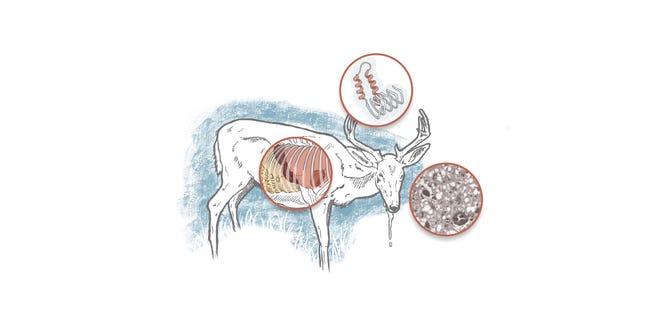Two hunters who ate meat from deer known to have chronic wasting disease − or “zombie deer disease” − developed similar neurological conditions and died, raising concerns that it can pass from animals to humans.
Found in deer in northern Colorado and southern Wyoming in the 1990s, chronic wasting disease (CWD) has been recorded in free-ranging deer, elk and moose in at least 32 states across all parts of the continental U.S., according to the U.S. Centers for Disease Control and Prevention.
Deer infected with CWD may be called “zombie deer” because the disease leads to weight loss, lack of coordination, stumbling, listlessness, weight loss, drooling, and lack of fear of people.
Scientists and health officials have been concerned that CWD could jump to humans as mad cow disease did in the United Kingdom in the ’90s. In 2022, scientists in Canada published a study, based on mice research, suggesting a risk of CWD transmission to humans.
Here’s what you need to know about chronic wasting disease and whether you need to worry about it.

Researchers identify troubling case involving 2 deaths
Researchers at the University of Texas Health Science Center at San Antonio have reported how two hunters who ate venison from a deer population known to have CWD died in 2022 after developing sporadic Creutzfeldt-Jakob disease (CJD), which is a neurological disease like CWD.
The second man to die, who was 77, suffered “rapid-onset confusion and aggression,” the researchers said, and died within a month despite treatment.
“The patient’s history, including a similar case in his social group, suggests a possible novel animal-to-human transmission of CWD,” they wrote in the case report, presented earlier this month at the annual meeting of the American Academy of Neurology, and published in peer-reviewed journal Neurology.
The researchers did not say where the men lived or hunted. But the highest concentration of CWD-infected deer can be found in Kansas, Nebraska, Wisconsin and Wyoming, according to CDC and US. Geological Survey reports.
Because of the difficulty in distinguishing between the diseases, the researchers said the case does not represent a proven case of transmission. However, “this cluster emphasizes the need for further investigation into the potential risks of consuming CWD-infected deer and its implications for public health,” they wrote.

‘Zombie deer disease’:What to know about chronic wasting disease and its spread in the US.
What is ‘zombie deer disease’? What are prion diseases?
Also known as chronic wasting disease, “zombie deer disease” is a prion disease, a rare, progressive and fatal neurodegenerative disorder that affects deer, elk, moose and other animals, the CDC says.
In prion diseases, the abnormal folding of certain “prion proteins” leads to brain damage and other symptoms, according to the CDC. Prion diseases, which usually progress rapidly and are always fatal, can affect humans and animals.
Creutzfeldt-Jacob disease (CJD) and variant Creutzfeldt-Jacob disease (vCJD), which is a form of mad cow disease, are prion diseases found in people.
Mad cow disease is an example of a prion disease that can spread from cattle to humans, and some researchers have likened “zombie deer disease” to it.
For instance, with mad cow disease, it usually took four to six years from infection for cattle to show symptoms, according to the Food and Drug Administration. Deer may have an incubation period of up to two years before the onset of symptoms. So, the animals could have the disease but look normal until the onset of symptoms, such as weight loss, notes the U.S. Geological Survey.
The development of vCJD in humans in the wake of mad cow disease – its official name is bovine spongiform encephalopathy, or BSE – through eating meat from contaminated cattle has concerned scientists about the possible transmission of chronic wasting disease (CWD) to humans.
Can ‘zombie deer disease’ be transmitted to humans?
Even though there’s been no known confirmed case of deer-to-human transmission of “zombie deer disease,’ concerns have risen since officials found CWD in a dead deer in Yellowstone National Park in November.
“As of yet, there has been no transmission from deer or elk to humans,” Jennifer Mullinax, associate professor of wildlife ecology and management at the University of Maryland, told BBC. “However, given the nature of prions, CDC and other agencies have supported all efforts to keep any prion disease out of the food chain.”
Should CWD transmit to humans, it could create a “potential crisis” similar to what mad cow disease caused, Michael Osterholm, director of the Center for Infectious Disease Research and Policy at the University of Minnesota, told BBC.
“However, it’s important to note that BSE and CWD prions differ structurally and we do not yet know whether the pathology and clinical presentation would be comparable if CWD transmission to humans were to occur,” he said.
Meanwhile, chronic wasting disease continues to spread to more states, with the most recent being Indiana. The disease was detected earlier this month in a male white-tailed deer in the northeastern part of the state, which borders part of Michigan where CWD had previously been detected, according to the Center for Infectious Disease Research and Policy.
The U.S. Geological Survey updated its tracking of chronic wasting disease on Friday to include 33 states (adding Indiana), as well as four Canadian provinces and four other countries (Finland, Norway, Sweden and South Korea).
Contributing: Sara Chernikoff and Julia Gomez.
Follow Mike Snider on X and Threads: @mikesnider & mikegsnider.
What’s everyone talking about? Sign up for our trending newsletter to get the latest news of the day
Getting You Seen Online
Thank You! Source link

